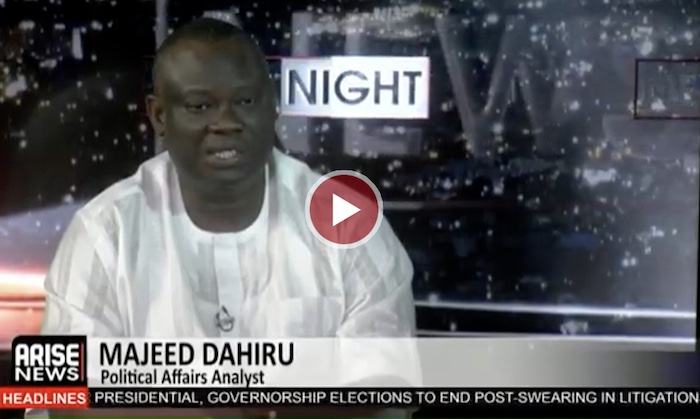
Political affairs analyst Majeed Dahiru says the Peoples Democratic Party (PDP) is facing a deep crisis because of its failure to zone the 2023 presidential ticket to the South, particularly the South-East, a move he described as “a mortal sin” that has now led to mass defections and internal collapse.
Speaking on ARISE News on Tuesday following the defection of Governor Peter Mbah of Enugu State to the ruling All Progressives Congress (APC), Dahiru said the governor’s decision was not just about “aligning with the centre” but a symptom of a deeper political problem within the PDP.
“Before he talked about aligning with the centre, Governor Mbalve said something more profound — that the South-East, and Ugo State in particular, have been a very loyal and consistent support base for the PDP since 1998. Yet, their voices were not heard, and the party took the region for granted. That, to me, is the real reason for these defections,” Dahiru said.
He explained that while access to the president and national caucus could be part of the motivation for governors joining the ruling party, the root cause was the PDP’s disregard for the principle of zoning.
“In the prelude to the 2022 presidential primaries, I wrote extensively warning the PDP against jettisoning zoning to the South. I said if the party failed to do so, it would run into troubled waters and sink into oblivion in the post-Buhari era. That is exactly what is happening now,” he stated.
Dahiru described the current court cases and leadership crises within the PDP as “a symptom of a deeper ailment,” blaming it on what he called “the validation of zoning” — a political mistake that alienated the South.
“The Southern part of this country, especially the South-East, has been the most consistent support base for the PDP since 2015. When the party fell from power, the South-East was its oxygen. At a time when 17 Southern governors met in Asaba to demand power shift to the South, common sense dictated that the PDP should have gone to the South-East, while the APC went to the South-West,” he said.
According to him, the PDP had an opportunity to unite the South and regain national strength through Peter Obi, who “ticked all the boxes” as a candidate
“The party had in its ranks a candidate who was phenomenally popular, from the right region, and could have galvanised massive followership — I’m talking about Peter Obi. But they lost that chance, and in the process, they lost the South-East,” Dahiru lamented.
He noted that the PDP’s influence had declined so sharply that “in Anambra State, which used to be a PDP stronghold, not a single person picked a nomination form for the governorship primaries.”
On the possibility of more defections, Dahiru said the PDP’s internal fractures worsened after the 2023 election.
“When Atiku happened to the PDP, the party developed two problems — one benign and one malignant. The benign one was Peter Obi, who quietly left and took the party’s southern support base with him. The malignant one was Nyesom Wike, who stayed behind but declared support for the APC president. Wike’s presence ensures that the PDP remains in perpetual crisis, weakened and unable to stand up to the ruling party,” he said.
Addressing the broader issue of political defections in Nigeria, Dahiru dismissed them as largely inconsequential because of the lack of ideological difference between parties.
“Nigerian politics is not ideologically driven. It’s about power and self-service. There’s little or no difference between the PDP and the APC. Many politicians simply move where it suits them. So I don’t get bothered when people move from one to the other,” he argued.
However, he said defections from the Labour Party were more troubling.
“If there is any party Nigerians should be worried about losing members, it’s the Labour Party. Unlike the PDP or APC that rely on money and structure, Labour emerged through people power — ordinary Nigerians who voted under the rain and sun without inducement. So when their elected representatives start defecting to the APC, that’s a bigger betrayal,” Dahiru warned.
He concluded that Nigeria missed a chance to strengthen its democracy when politicians who benefitted from genuine people’s movements began to act like the old political elite.
“We lost an opportunity to consolidate democracy. The people sacrificed to build a new movement, but those who came through it are now behaving like the establishment they were meant to replace,” he said.
Boluwatife Enome



